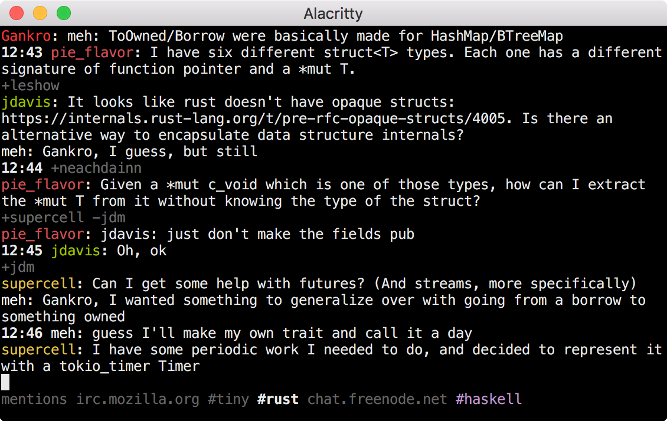tiny is an IRC client written in Rust.
-
Clean UI: consecutive join/part/quit messages are shown in a single line, time stamps for a message is omitted if it's the same as the message before. (inspired by irc-core)
-
All mentions to the user are collected in a "mentions" tab, including server and channel information. "mentions" tab solves the problem of missing mentions to you in channels after hours of inactivity.
-
Mentions to the user in a channel is highlighted (the channel tab is also highlighted in the tab list)
-
Simple config file format for automatically connecting to servers, joining channels, registering the nickname etc. See configuration section below.
-
Nick tab-completion in channels
-
Nicks in channels are colored.
-
Disconnect detection and automatic reconnects. You can keep tiny running on your laptop and it automatically reconnects after a sleep etc.
-
Key bindings inspired by terminal emulators and vim. See key bindings section below.
-
Configurable colors
-
SASL authentication
-
Configurable desktop notifications on new messages
-
znc compatible
Install the Rust nightly toolchain, clone the repo, and run
cargo install --path tiny
If you don't want to clone the repo, you can use
cargo install --git https://github.com/osa1/tiny
If you have an older version installed, add --force to the command you're
using.
Arch Linux users can install tiny from the AUR.
Since version 0.3.0 tiny needs OpenSSL or LibreSSL headers and runtime libraries. See rust-openssl's README for instructions on installing them.
- OpenSSL or LibreSSL
- libdbus [Linux only]
tiny is tested on Linux and OSX.
tiny looks for these places for a config file:
$XDG_CONFIG_HOME/tiny/config.yml- (when
$XDG_CONFIG_HOMEis not defined)$HOME/.config/tiny/config.yml - (deprecated)
$HOME/.tinyrc.yml
when a config file is not found in one of these locations tiny creates one with defaults and exists, printing path to the config file. Edit that file before re-running tiny to change the defaults.
A note on nick identification: Some IRC servers such as ircd-seven (used by
Freenode) and InspIRCd (used by Mozilla) support identification via the PASS
command. This way of identification (rather than sending a message to a service
like NickServ) is better when some of the channels that you automatically
join require identification. To use this method enter your nick password to the
pass field in servers.
By default (i.e. when no command line arguments passed) tiny connects to all servers listed in the config. tiny considers command line arguments as patterns to be matched in server addresses, so you can pass command line arguments to connect to only a subset of servers specified in the config. For example, in this config:
servers:
- addr: irc.mozilla.org
...
- addr: chat.freenode.net
...By default tiny connects to both servers. You can connect to only the second
server by passing freenode as a command line argument.
You can use --config <path> to specify your config file location.
-
C-a/C-eto move cursor beginning/end in the input field -
C-kfor deleting rest of the line -
C-wfor deleting a word -
C-left/C-rightfor moving one word backward/forward -
page up/page downorshift-up/shift-downor for scrolling -
C-n/C-pfor next/previous tab -
C-c enterto quit. -
alt-{1,9}switch to nth tab -
alt-{char}switch to next tab with underlinedchar -
alt-0switch to last tab -
alt-left/rightmove tab to left/right -
C-xedit current message in$EDITOR
Commands start with / character.
-
/msg <nick> <message>: Send a message to a user. Creates a new tab. -
/join <channel>: Join to a channel -
/close: Close the current tab. Leaves the channel if the current tab is a channel. Leaves the server if the tab is a server. -
/connect <hostname>:<port>: Connect to a server. Usesdefaultsin the config file for nick, realname, hostname and auto cmds. -
/connect: Reconnect to the current server. Use if you don't want to wait tiny to reconnect automatically after a connectivity problem. -
/away <msg>: Set away status -
/away: Remove away status -
/nick <nick>: Change nick -
/names: List all nicks in the current channel. You can use/names <nick>to check if a specific nick is in the channel. -
/reload: Reload configuration -
/clear: Clears tab contents -
/switch <string>: Switch to the first tab which has the given string in the name. -
/statusline: Enable or disable status line on top which gives you info about current settings of a tab. -
/ignore: Ignorejoin/quitmessages in a channel. Running this command in a server tab applies it to all channels of that server. You can check your ignore state in the status line. -
/notify [off|mentions|messages]: Enable and disable desktop notifications. Running this command in a server tab applies it to all channels of that server. You can check your notify state in the status line.
See CONTRIBUTING.md.


